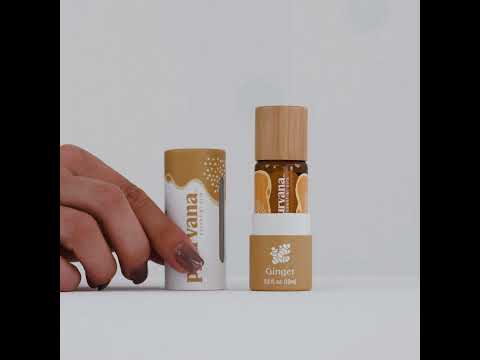Ginger Oil – 15ml
Ginger Oil – 15ml
Couldn't load pickup availability
Ginger has an immediately recognizable, spicy scent that can uplift your mood when diffused and it can be diluted for a warming massage.
More Information


What is Ginger Oil?
The ginger plant, Zingiber officinale, is a flowering herbaceous perennial. It is part of the Zingiberaceae family, which also includes turmeric and cardamom. The Zingiber genus includes a large number of different species, all of which can be referred to as ginger. However, it is Zingiber officinale that is most often used for cooking and to distill essential oil. One interesting fact is that the ginger plant is what is known as a cultigen. This means that over the course of history it has been selectively bred by humans and Zingiber officinale no longer exists in its original wild state.
Humanity has cultivated ginger since ancient times and there is evidence that it was grown by the Austronesian people who brought it to the Pacific islands around 3000 BC. Confucius made the first known written reference to ginger in 500 BC and claimed he ate a small amount before each meal to aid digestion. In the 13th and 14th centuries, ginger was a highly valuable herb and a pound of it cost the same as a sheep.
We extract ginger oil from the root, also known as a rhizome, using steam distillation. The ginger roots are placed in a vat and steam is introduced to vaporize the volatile compounds in the plant. We then distill this vapor and purify the oil.
Complementary Scents
The sharp notes of ginger oil blend well with citrus oils including bergamot, orange, and lemon. For a nostalgic winter blend, pair ginger with cinnamon or clove. This essential oil also complements floral aromas such as ylang ylang and rose.
Primary Benefits
In aromatherapy, ginger has earned the nickname “Oil of Empowerment.” This is because it is thought to inspire a feeling of confidence. Spiritually, ginger oil is linked to the solar plexus chakra, the center of personal power. Although this is of course subjective, diffusing ginger oil before a big event or any other time you need a boost of self-esteem can help put you in a better mindset.
Ginger is a natural aphrodisiac and diffusing it can help create a more sensual atmosphere. Floral scents like ylang ylang or rose can contribute to this mood when mixed with ginger oil for diffusion. By diluting this essential oil with a carrier oil, you can even make your own massage blend. The warming effects of the oil can contribute to a more soothing experience.
This essential oil is also great for relaxation and you can enjoy the benefits of its soothing scent by adding it to your bath. Undiluted ginger oil can damage your skin, so make sure to dilute it with a carrier oil before adding it to your bathwater. Adding Epsom salt can also help break up oil droplets.
How to Use Ginger Essential Oil
To diffuse ginger oil, follow the instructions for your specific diffuser. This usually involves adding a few drops of ginger essential oil to water and diffusing for a limited period of time. Adding too much oil or diffusing for too long can lead to an overpowering smell, so it is important to use only a small amount of 100% pure oils and to limit the diffusion time.
Pure essential oils can irritate or damage your skin. When using ginger oil topically, you should dilute it with carrier oil first. Some great options include coconut oil, jojoba oil, and olive oil. We recommend using three drops of oil to one teaspoon of carrier oil, but if you have sensitive skin you may want to use a lower concentration. You should always test on a small area before applying the diluted oil.
Cautions
Never apply pure essential oil directly to your skin. You should dilute with a carrier oil before any topical application of ginger oil. Additionally, some people are more sensitive or allergic to compounds in specific oils. Always test on a small area first and if you notice any adverse reaction, stop using the oil immediately and seek medical attention.
Keep out of reach of children.
If you are pregnant, nursing, or under the care of a physician, consult your health care provider before using ginger or any other essential oil.
This essential oil is for external use only and should not be ingested.
Pure essential oils are flammable and should be stored in a cool, dry location away from any open flames or excess heat.
What's Trending
-
 50%
50%
OFFBergamot Oil – 15ml
Regular price $11.50Regular priceUnit price / per$23.00Sale price $11.50Sale -
 50%
50%
OFFCinnamon Oil (Bark) – 15ml
Regular price $10.00Regular priceUnit price / per$20.00Sale price $10.00Sale -
 50%
50%
OFFCinnamon Oil (Leaf) – 15ml
Regular price $12.00Regular priceUnit price / per$24.00Sale price $12.00Sale -
 50%
50%
OFFCitronella Oil – 15ml
Regular price $7.50Regular priceUnit price / per$15.00Sale price $7.50Sale -
 50%
50%
OFFClary Sage Oil – 15ml
Regular price $15.00Regular priceUnit price / per$30.00Sale price $15.00Sale










